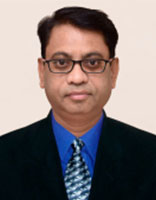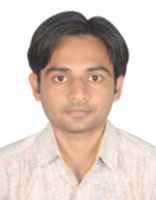Organized by
Centre of Excellence on Soil & Water Management Research Testing and Training Centre Junagadh Agricultural University, Junagadh (Gujarat), India.







Distinguished Professor and Regents Professor, Texas A&M University, USA

Deputy Director General (Agril. Engg.)
Indian Council of Agricultural Research,
New Delhi

Director, CAMGIS, Faculty of Engineering and IT, UTS, Sydney, Australia

Lecturer - ICT, CQ University, Queensland, Australia

Research Professional AD, Fort Valley State University, Georgia, USA

Founder, Flora Consult, Pune
The soft copy of the abstracts/ full length papers should be sent through Email id: coeswm@jau.in
The abstract of unpublished research work should be in English using MS word (Single space; Font Times New Roman; Font size- 12) and should not exceed 350 words. It must contain title of the paper, name(s) of author(s) followed by their affiliation, e-mail of corresponding author and keywords. The name of presenting author should be underlined.
Full length paper must be original, ethical, with key burning issue, less than 15% plagiarism, unpublished, English languages, MS Word, Times New Roman, 12 Fonts with single line spacing and with Abstract, Key words, Introduction, Material and Methods, Results and Discussion, conclusion and references (not exceeding 6000-7000 words).
| Type of Delegates |
Early Birds (Upto 15/11/2024) |
Late Registration | Spot Registration |
|---|---|---|---|
| Students | INR 2500/- | INR 3500/- | INR 4500/- |
| JRF/SRF/RA/YP-I & II & Equivalent | INR 4500/- | INR 5500/- | INR 6500/- |
| Faculty/Scientists/Delegates/Working Professionals | INR 7500/- | INR 8500/- | INR 9500/- |
| Industry/Corporate/NGO Professionals | INR 15000/- | INR 15000/- | INR 15000/- |
| Accompanying Person | INR 2000/- | INR 2000/- | INR 2000/- |
| Foreign Delegates | USD 200 | USD 250 | USD 300 |
Discover essential dates for the upcoming seminar.
| Last Date for Receipt of Abstract | August 31, 2024 |
|---|---|
| Notification of Acceptance | September 10, 2024 |
| Last Date for Receipt of Full Paper | October 15, 2024 |
| Last Date for Receipt of Registration Form | November 15, 2024 |
| Conference Dates | January 23-24, 2025 |
The registration form can be filled online through https://ictpairs.in. Payment of the registration fee can be made on-line in the following account details or scanning QR code given below.
| Name of Current Account | Convener, WMCSA |
| Name of the Bank | SBI, JAU Campus Branch, Motibaugh, Junagadh, 362001 (Gujarat) India |
| Current A/C No | 34415380738 |
| IFSC Code | SBIN0010980 |
| MICR Code | 362002007 |
| Journal /Book | Publishing Charges |
|---|---|
| Conference Book with ISBN Accepted Full length papers will be published as book chapter in conference proceedings with ISBN by a reputed publisher. | Book Chapters Publication Charges are included with registration fee. |
| Plant Archives
Accepted full length papers will be published in special issue of plant archives an International Journal upon payment of Publication Charges. NAAS Rating -5.59 (2024) ISSN:0972-5210. Open Access, Indexing and Peer Review Journal |
₹ 2500/- * Per Paper |
The conference invites a vibrant mix of attendees, spanning scientists, researchers, educators, students, government officials, innovative farmers, and budding entrepreneurs across the globe from Agriculture, Agricultural Engineering, Horticulture, Forestry, Agri Business Management and other allied sectors, fostering a dynamic exchange of ideas and expertise.

















We'd love to hear from you
+91-99093 61030
+91-97266-19831

Organizing Secretary
Research Scientist (Agril. Engg.)
Centre of Excellence on Soil and Water Management
Research Testing and Training Centre (RTTC), JAU, Junagadh.
coeswm@jau.in | www.ictpairs.in

Co-Organizing Secretary
Assistant Research Scientist,
Centre of Excellence on Soil and Water Management
Research Testing and Training Centre (RTTC), JAU, Junagadh.
coeswm@jau.in | www.ictpairs.in